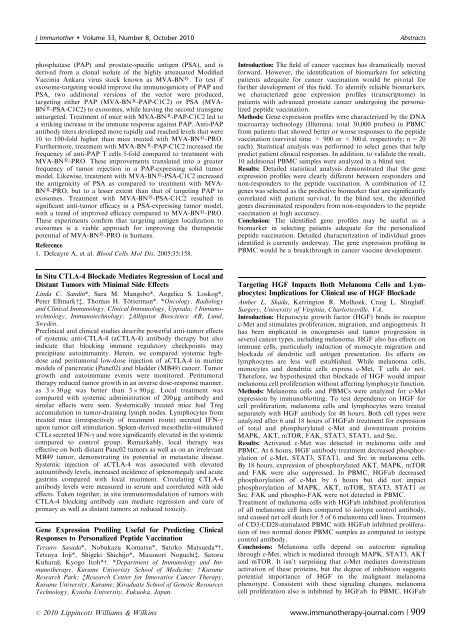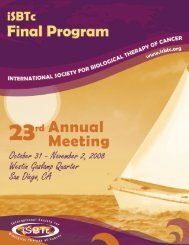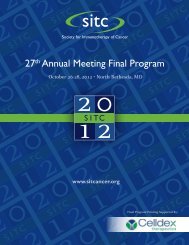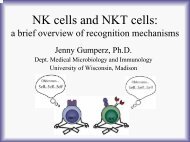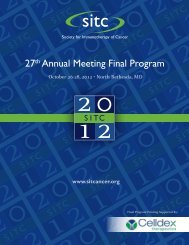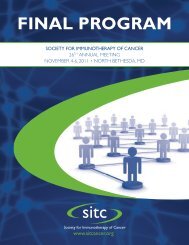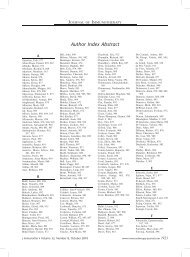Abstracts for the 25th Annual Scientific Meeting of the International ...
Abstracts for the 25th Annual Scientific Meeting of the International ...
Abstracts for the 25th Annual Scientific Meeting of the International ...
Create successful ePaper yourself
Turn your PDF publications into a flip-book with our unique Google optimized e-Paper software.
J Immuno<strong>the</strong>r Volume 33, Number 8, October 2010<br />
<strong>Abstracts</strong><br />
phosphatase (PAP) and prostate-specific antigen (PSA), and is<br />
derived from a clonal isolate <strong>of</strong> <strong>the</strong> highly attenuated Modified<br />
Vaccinia Ankara virus stock known as MVA-BN s . To test if<br />
exosome-targeting would improve <strong>the</strong> immunogenicity <strong>of</strong> PAP and<br />
PSA, two additional versions <strong>of</strong> <strong>the</strong> vector were produced,<br />
targeting ei<strong>the</strong>r PAP (MVA-BN s -PAP-C1C2) or PSA (MVA-<br />
BN s -PSA-C1C2) to exosomes, while leaving <strong>the</strong> second transgene<br />
untargeted. Treatment <strong>of</strong> mice with MVA-BN s -PAP-C1C2 led to<br />
a striking increase in <strong>the</strong> immune response against PAP. Anti-PAP<br />
antibody titers developed more rapidly and reached levels that were<br />
10 to 100-fold higher than mice treated with MVA-BN s -PRO.<br />
Fur<strong>the</strong>rmore, treatment with MVA-BN s -PAP-C1C2 increased <strong>the</strong><br />
frequency <strong>of</strong> anti-PAP T cells 5-fold compared to treatment with<br />
MVA-BN s -PRO. These improvements translated into a greater<br />
frequency <strong>of</strong> tumor rejection in a PAP-expressing solid tumor<br />
model. Likewise, treatment with MVA-BN s -PSA-C1C2 increased<br />
<strong>the</strong> antigenicity <strong>of</strong> PSA as compared to treatment with MVA-<br />
BN s -PRO, but to a lesser extent than that <strong>of</strong> targeting PAP to<br />
exosomes. Treatment with MVA-BN s -PSA-C1C2 resulted in<br />
significant anti-tumor efficacy in a PSA-expressing tumor model,<br />
with a trend <strong>of</strong> improved efficacy compared to MVA-BN s -PRO.<br />
These experiments confirm that targeting antigen localization to<br />
exosomes is a viable approach <strong>for</strong> improving <strong>the</strong> <strong>the</strong>rapeutic<br />
potential <strong>of</strong> MVA-BN s -PRO in humans.<br />
Reference<br />
1. Delcayre A, et al. Blood Cells Mol Dis. 2005;35:158.<br />
Introduction: The field <strong>of</strong> cancer vaccines has dramatically moved<br />
<strong>for</strong>ward. However, <strong>the</strong> identification <strong>of</strong> biomarkers <strong>for</strong> selecting<br />
patients adequate <strong>for</strong> cancer vaccination would be pivotal <strong>for</strong><br />
fur<strong>the</strong>r development <strong>of</strong> this field. To identify reliable biomarkers,<br />
we characterized gene expression pr<strong>of</strong>iles (transcriptome) in<br />
patients with advanced prostate cancer undergoing <strong>the</strong> personalized<br />
peptide vaccination.<br />
Methods: Gene expression pr<strong>of</strong>iles were characterized by <strong>the</strong> DNA<br />
microarray technology (Illumina; total 30,000 probes) in PBMC<br />
from patients that showed better or worse responses to <strong>the</strong> peptide<br />
vaccination (survival time > 900 or


